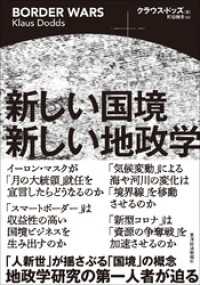- ホーム
- > 洋書
- > 英文書
- > Philosophy
基本説明
Scholars in diverse academic disciplines discuss the ways in which evidence is conceived, used, and manipulated in their own fields.
Full Description
Evidence - its nature and interpretation - is the key to many topical debates and concerns such as global warming, evolution, the search for weapons of mass destruction, DNA profiling, evidence-based medicine. In 2004 University College London launched a cross-disciplinary research programme "Evidence, Inference and Enquiry" to explore the question: "Can there be an integrated multidisciplinary science of evidence?" While this question was hotly contested and no clear final consensus emerged, much was learned on the journey. This book, based on the closing conference of the programme held at the British Academy in December 2007, illustrates the complexity of the subject, with 17 chapters written from a diversity of perspectives including Archaeology, Computer Science, Economics, Education, Health, History, Law, Psychology, Philosophy and Statistics. General issues covered include principles and systems for handling complex evidence, evidence for policy-making, and human evidence-processing, as well as the very possibility of systematising the study of evidence.
Contents
Foreword
1: Philip Dawid: Introduction
2: David Schum: Classifying Forms and Combinations of Evidence: Necessary in a Science of Evidence
3: Jason Davies: Disciplining the Disciplines
4: William Twining: Moving Beyond Law: Interdisciplinarity and the Study of Evidence
5: Philip Dawid; Amanda Hepler; David Schum: Inference Networks: Bayes and Wigmore
6: John Fox: Arguing about the Evidence: A Logical Approach
7: David Lagnado: Thinking about Evidence
8: Jill Russell and Trisha Greenhalgh: Rhetoric and Argumentation in Evidence-Based Policy Making
9: Terence Anderson: Generalisations and Evidential Reasoning
10: Peter Tillers: Of Inference Networks and Onto-Epistemology
11: Nancy Cartwright and Jacob Stegenga: A Theory of Evidence for Evidence-Based Policy
12: Hasok Chang and Grant Fisher: What the Ravens Really Teach Us: The Intrinsic Contextuality of Evidence
13: Alison Wylie: Critical Distance: Stabilizing Evidential Claims in Archaeology
14: David Colquhoun: In Praise of Randomisation
15: Jason Davies: Believing the Evidence
16: Mike Joffe: What Would a Scientific Economics Look Like?
17: Tony Gardner-Medwin: Reasonable Doubt: Uncertainty in Education, Science and Law
-

- 電子書籍
- 私を殺したワンコ系騎士様が、ヤンデレに…
-

- 電子書籍
- (※身体で覚える)とろあまえっち ~や…
-

- 電子書籍
- 新しい国境 新しい地政学
-

- 電子書籍
- ちん娘。~女体化した俺はアレを喪失した…
-

- 電子書籍
- ドーラク弁護士 2巻



